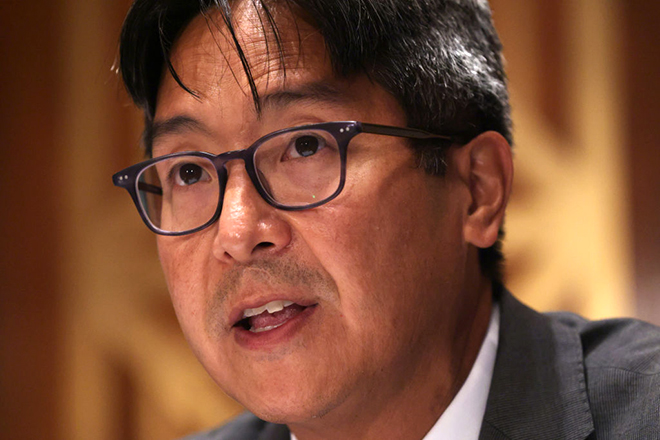Featured Topics
Featured Products
Events
S&P Global Offerings
Featured Topics
Featured Products
Events
S&P Global Offerings
Featured Topics
Featured Products
Events
S&P Global Offerings
Featured Topics
Featured Products
Events
Financial and Market intelligence
Fundamental & Alternative Datasets
Government & Defense
Professional Services
Banking & Capital Markets
Economy & Finance
Energy Transition & Sustainability
Technology & Innovation
Podcasts & Newsletters
Financial and Market intelligence
Fundamental & Alternative Datasets
Government & Defense
Professional Services
Banking & Capital Markets
Economy & Finance
Energy Transition & Sustainability
Technology & Innovation
Podcasts & Newsletters
13 Jan, 2022

Acting Comptroller of the Currency Michael Hsu testifies before the Senate Banking Committee on Aug. 3, 2021. Source: Alex Wong/Getty Images News via Getty Images
Acting Comptroller of the Currency Michael Hsu is likely to earn the necessary votes to lead the agency permanently, with his track record outweighing his role in a recent FDIC controversy in the eyes of Senate Democrats.
The snafu arose in December 2021 when two Democratic members of the FDIC board co-authored a joint statement seeking public comment on whether agency merger rules should account for systemic risk and consumer abuse concerns. They did so without the prior approval of FDIC Chairman Jelena McWilliams, the board's lone Republican.
The fact that Hsu, who also sits on the FDIC board, did not join his fellow Democrats in writing the joint statement and the OCC initially declined to confirm whether he voted to support the request for information, likely raised eyebrows in the Biden administration and among congressional Democrats, according to policy analysts.
Though Hsu eventually issued a statement supporting a review of bank merger rules, "his role with respect to the RFI would complicate his nomination," said Dan Stipano, an attorney at Davis Polk & Wardwell and former high-ranking lawyer at the OCC.
Still, Hsu's work as acting head of the agency should be enough to earn him a nomination as the permanent comptroller and garner the needed votes of Senate Democrats. He has been proactive on a broad range of issues supported by the White House, including exploring cryptocurrency regulation and issuing rules to improve lending in low- and moderate-income neighborhoods.
"I think he's been pretty active and had a high profile," said Ian Katz, managing director at Capital Alpha Partners, a bank consultancy. "He's pleased progressives."

Crypto crackdown
The outlook remains positive for Hsu, analysts said, especially compared to the tumultuous candidacy of the administration's previous pick for the job, Cornell University law professor Saule Omarova. She received significant pushback from Republicans and moderate Democrats over academic papers she wrote that advocated for the movement of all demand deposits into accounts managed by the Federal Reserve. Omarova ultimately requested that President Joe Biden withdraw her name from consideration, which he did.
Hsu's actions on cryptocurrency, in particular, have won plaudits from Democrats in Congress, according to Katz and other analysts.
Hsu announced in November 2021 that lenders wanting to offer certain crypto services must now demonstrate that they have an appropriate risk management and measurement process in place, among other requirements, before the OCC will issue a non-objection letter.
This policy is a sharp turn from the Trump era when banks could offer these crypto services without seeking official authorization.
The new policy is "definitely more palatable" to Democrats than the previous administration's policy, said Carleton Goss, counsel at Hunton Andrews Kurth LLP.
While Hsu has not completely ruled out OCC bank charters for cryptocurrency firms, the political picture for these charters remains murky as he puts them under the microscope.
"At the OCC, we have begun to increase our focus on the banks that provide services to large fintechs and facilitate synthetic banking outside of the bank regulatory perimeter," Hsu said in a November 2021 speech, noting that his agency is scrutinizing bank-fintech partnerships.
New Community Reinvestment Act regulations
Another issue likely to please Democrats, analysts said, is Hsu's work on the Community Reinvestment Act, a law that seeks to ensure banks are providing financial services to low-income and minority neighborhoods.
In December 2021, the OCC issued a final rule that rescinded a June 2020 update to the CRA that was widely criticized by Democrats and the White House and replaced it with rules adopted jointly by federal banking agencies in 1995.
The final rule went into effect on Jan. 1 and applies to national banks and federal and state savings associations.
In the meantime, the OCC, the Federal Reserve and the FDIC are working to modernize the CRA regulatory framework and promote consistency for all insured depository institutions, according to an OCC statement.
Continuity a key
Hsu's experience in the job, his previous roles in the administration, and his loyalty to the Biden administration will likely get him confirmed.
The acting official has been at the OCC since May 2021, and "maybe what we need right now is continuity," Goss told S&P Global Market Intelligence.
Hsu took his current role after a lengthy tenure at the Fed, where he led the program supervising the global systemically important banks.
"It’s very important to have someone who has a global view," said Mayra Rodriguez Valladares, managing principal of financial consultancy MRV Associates LLC. "These heads of regulatory agencies are supposed to have a long-term view."
And his work to implement the White House agenda will win him points, according to Bert Ely, principal at Ely & Co. Inc., a bank consultancy.
"He’s demonstrated his fealty, I think that enhances his shot," Ely said in an interview with S&P Global Market Intelligence. "I would be surprised if he doesn’t get nominated."